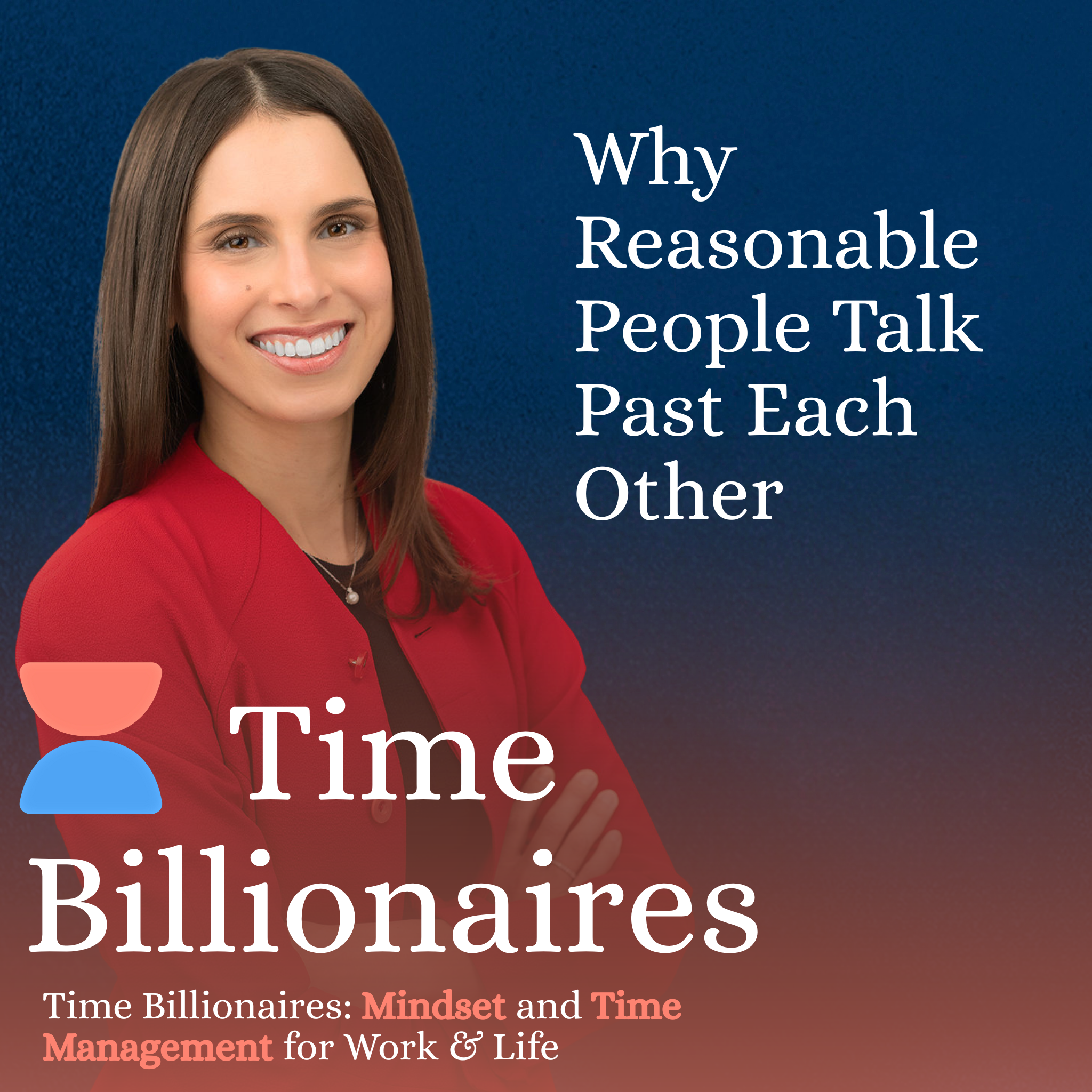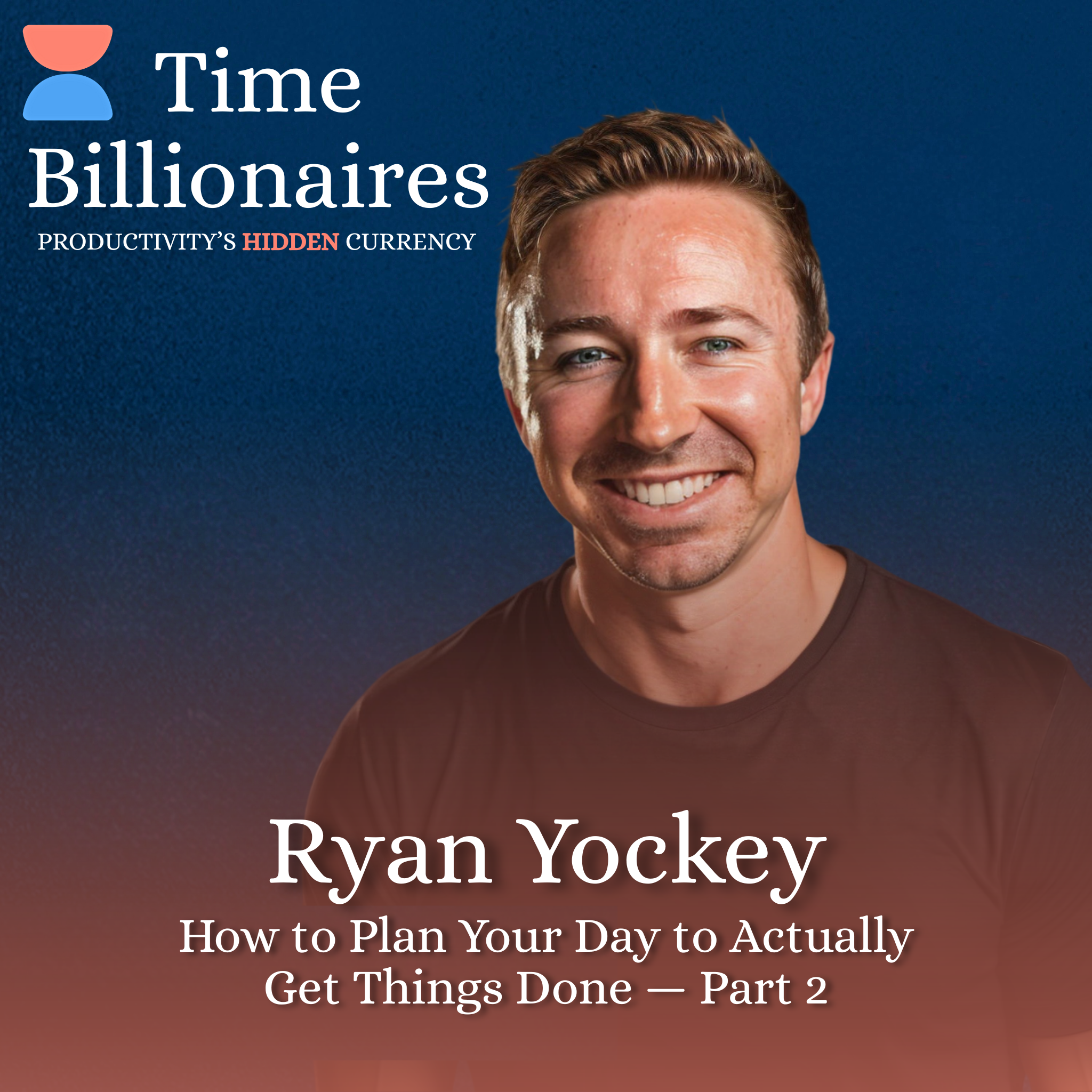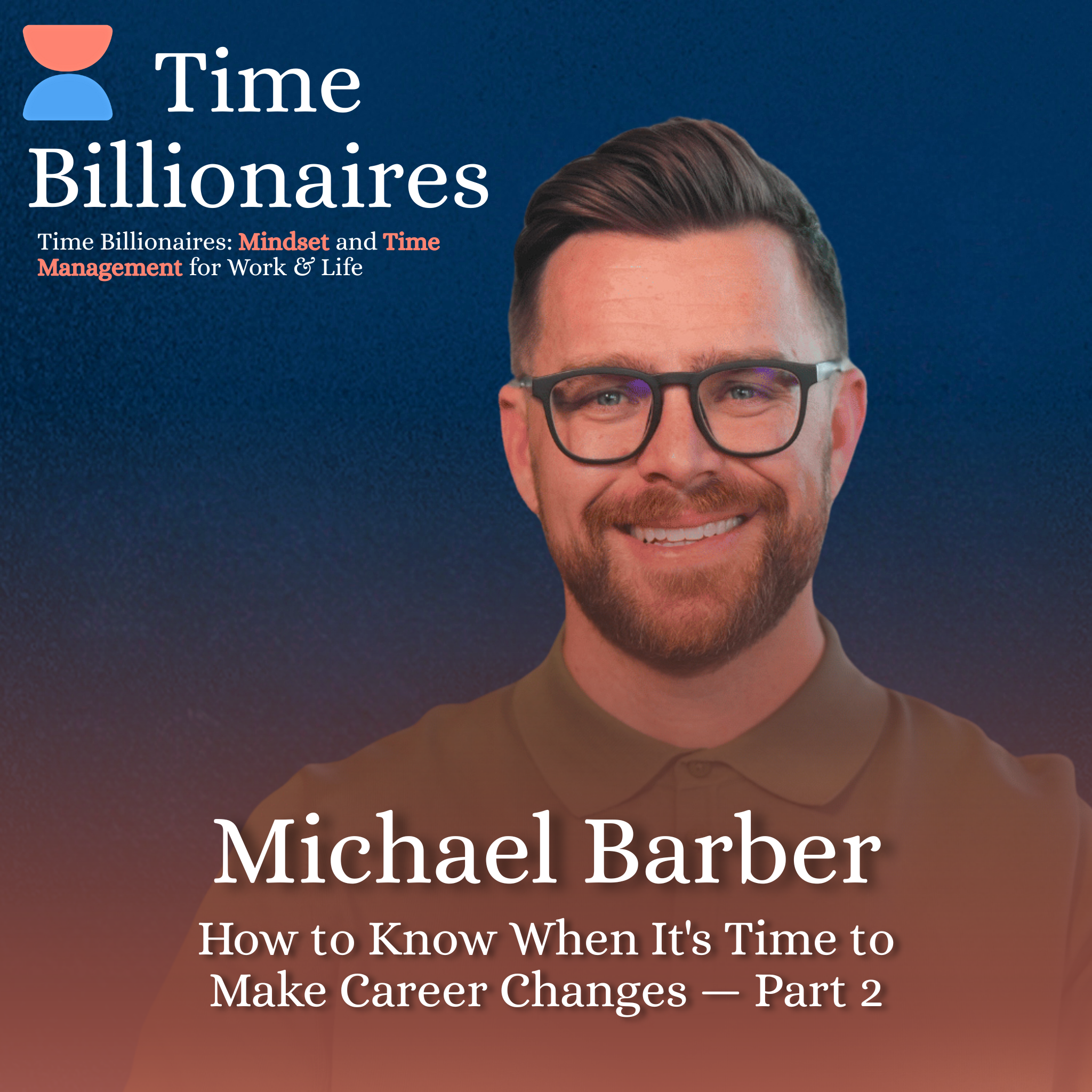Episode Transcript
[00:00:00] Speaker A: You should feel fine being good at work this week, not having to be excellent every week, and being excellent in your home life can be a top priority that week. If you need to balance those things out. If you name it and you can talk about it, not only can you set up a permission structure for yourself, but you can allow other people to help you.
[00:00:33] Speaker B: This is a two part episode. If you want to check out the first part, listen to the previous episode of Time Billionaires. We want to communicate. It's not just this mindless consumption. And here you've given us very practical ways to use tech to actually find more time in the day as opposed to feeling constantly plugged in.
[00:00:52] Speaker A: Right. And it's, it's also given me like a bit more of a relaxed approach at work because. Because when you have 17 things in front of you and you have three teenagers running around and you're like, okay, like, I'm very stressed, it's actually giving me a lot of peace in that I know that I have tools at my disposal to tackle those 17 things because tech can help me versus feeling like I have to do all of that myself, manually, with my own hands, my own brain.
I'm able to actually use that tool set to also impact my mental health, which is relaxing a little bit and finding gems of time that's sort of joyful. When you kind of go like, oh, I found 15 minutes I didn't know I had.
That's fantastic, right?
[00:01:44] Speaker B: Yeah, it's better than $20 in your pocket because it just feels like there's so much potential.
[00:01:48] Speaker A: Yeah, so it's totally better than $20 in your pocket.
I mean, having kids and having a job, there's always a balance of where you put your energy. And so I think there's probably just a permission structure that needs to exist that I've been really working on very hard over the last 15 years of the permission to really succeed at work and have that be a focus sometimes, and also sometimes for that to take a backseat so that you can have the time and energy to focus successfully on your personal life.
And I think that's been a real difficult balance for a lot of, especially women in tech, but people in tech in general and perhaps in other industries too, perhaps healthcare, things that are very heavy and difficult on your time management.
And so I think I'm just saying there, you should feel fine.
You know, being good at work this week, not having to be excellent every week, and being excellent in your home life can be a top priority that week. If you need to Balance those things out.
I don't really think you can do both and survive.
Like, I don't think you could be excellent at both all the time and literally survive. Your mental health, your physical health, all of those things will take a toll if you're trying to do that. So I guess I would just say be really intentional about giving yourself permission to feel good about a good week.
[00:03:25] Speaker B: Yes. I couldn't agree more. The intentionality in the balance, for sure. I think that I started my career thinking that balance was daily. I needed to have all of the important components of my life.
Relationship, connection, exercise, learning, good work in a day that is impossible. So being intentional about this is a work heavy week. Hey, family. This is a work heavy week. Don't expect dinner with me this week. I'll be out before you're up. Just letting the expectation be set means they can plan their day too. My husband can go on bike rides, not wait for me, not rush home, not feel like I'm just the intentionality of communicating. This is what this week looks like for me. Here's what to expect.
Same with at work. These are what the demands look like for me this week. Here's what to expect. And then nobody's wondering what's happening. And I find that permission for yourself to be that much easier when we just label it. Here's where I am and here's how I'm showing up. Let's do it. I worked at a company that used to have red, yellow, green at the start of a meeting. How much energy are you showing up with for this meeting? And it was helpful. And sometimes there would be a one word. I'm red. Family stuff. I'm yellow. Distracted. I'm green. Things are great. That webinar went well and it just helped us triangulate. Maybe if we needed somebody to take on more of the action items, be more diligent with the notes who was ready to do that. And it was great because it became this big balance. And we knew people if there was something on their mind that was consuming them, we knew where it was coming from. And I think that's where a lot of misunderstanding comes from is just not labeling that. And either misreading people's cues because we don't know where they're coming from or being frustrated that people aren't picking up on things that we think are obvious. Don't they know I'm overwhelmed? Look how many things are on my to do list. But of course they don't. They don't know how you'll handle that. And so I think just that intentionality, that balance and the permission for yourself, but articulating where you are and what you need from the people around you is a huge part of what you just said. And I love the way you've incorporated tech to do that.
[00:05:29] Speaker A: You said something that I was going to say, so you hit on it before me. But I think it's really important to reiterate, which is if you name it and you can talk about it, not only can you set up a permission structure for yourself, but you can allow other people to help you. Right. So your husband might say, I see that you're work heavy this week. Let me do the grocery shopping and I'll clean the house, you don't have to worry about it. And you articulated it in a, in a work scenario, which I really love this red, yellow and green idea, although I can see where being red might be difficult to say. So there, there's definitely got to be trust there. But I, I love that concept of it. But I have a hard time letting people help me because I'm such a doer and such an achiever and such a. I've got to control my whole life, you know, everything's gotta be okay.
And so I think if you give permission structure to be okay in one place and okay in the other place and people know where you're at, they can then actively support you without you having to even ask. And, and that's something that I think can be a difficult thing for people to say. Like I'm low energy. Can you please help me? That's, that's pretty hard for some people to say.
[00:06:41] Speaker B: It totally is. Yeah. The psychological safety, the normalizing failure in communicating is big. But I also think for me, I used to ask questions like why am I struggling with this in a self critical way? Why can't I get more done? And when I just had a slightly different inflection. Why am I struggling with this?
Oh, I'm doing a lot. There's a lot on my plate. That self compassion trickled into how I managed my team, how I thought about what I needed when it was this sort of shaming, accusatory, why can't I do more?
Not productive. Yeah, compassionate. Why can't I do more? This week that the answer came from actually asking a question with curiosity. And I think we talk about curiosity and communication with other people a lot. And the nonviolent communication with ourselves yields as much insight in my experience.
[00:07:32] Speaker A: Well, and this is, this is where going back to that routine that I have in the morning is actually a really great place to. To center myself with myself so that I can be kind to myself.
And I can tell, like if I immediately out of bed, I can tell, am I already having a tired day? Is. Is just stretching, feeling hard, you know, and so you. It's a really great way to immediately be in tune with yourself so that you know that if something's not happening in the way that you want it to happen today, that you can reflect back and say like, oh, well, you know what? Yeah, this morning I felt pretty tired. I gotta. I have to listen to that.
Um, yeah. So I think if you can find a moment in the day to just check in with yourself, that's super, super important in a non critical way. Which is what you're saying is hard.
[00:08:26] Speaker B: It is, yeah. The one last exercise I'll leave folks with is to check in, like you're saying. Just came to mind of what was my biggest priority for today. Am I on track? If not, why not? And letting that check come from a place of curiosity. Am I on track to hit my biggest priority day? If I'm not, is it because emails felt urgent? I didn't say no to meetings that I got pulled into last minute? If not, why not? Tends to be the unlock for the solution to making that productive.
[00:08:59] Speaker A: Yeah, that's a great piece of advice.
[00:09:03] Speaker B: I love all of our conversations. Joe, this was great. Thank you. Learned so much from you. Wouldn't be on this podcast journey without you. And I just really appreciate you sharing all your insight. We'll link to your LinkedIn in the show notes.
[00:09:16] Speaker A: Thank you so much for having me.
It.


